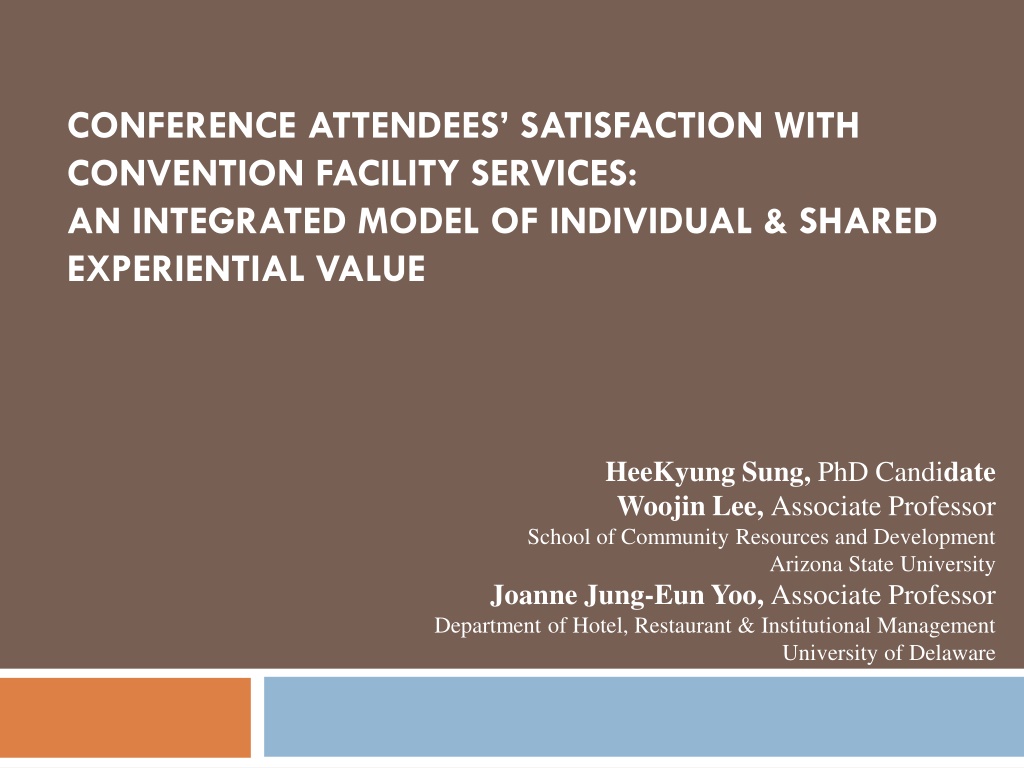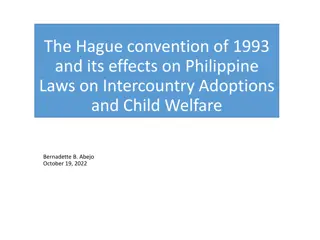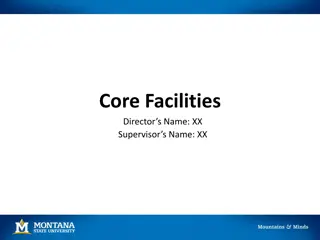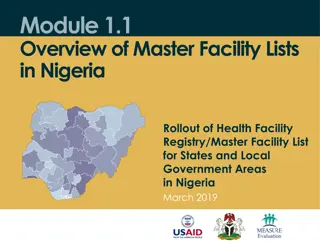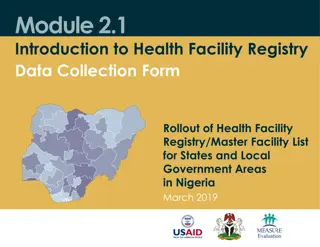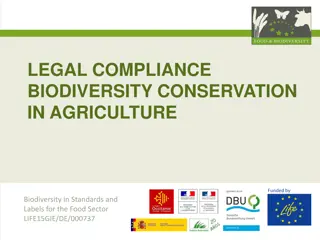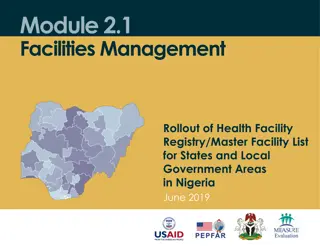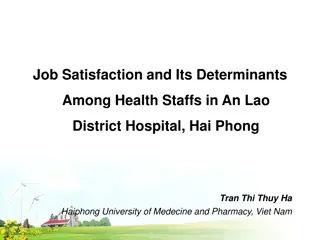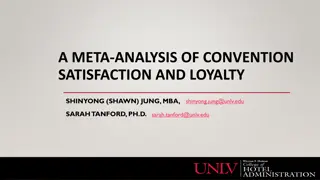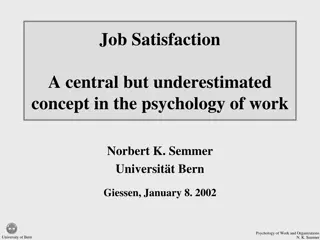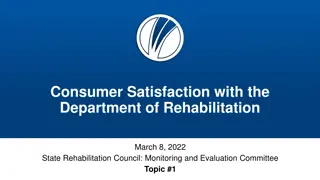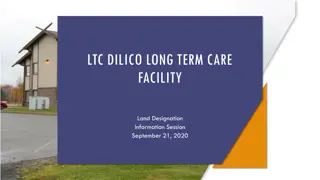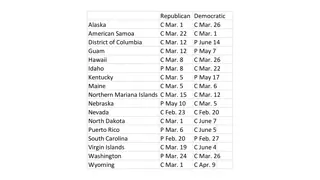Understanding Convention Attendees' Satisfaction with Facility Services
This study explores the relationship between service quality, experiential value, and satisfaction of convention attendees at a facility. It delves into individual experiential values and their impact on perceived service quality, aiming to provide insights into enhancing the overall convention experience. By examining factors such as basic, performance, and excitement attributes, the research seeks to contribute to the enhancement of service delivery in the convention industry.
Download Presentation

Please find below an Image/Link to download the presentation.
The content on the website is provided AS IS for your information and personal use only. It may not be sold, licensed, or shared on other websites without obtaining consent from the author. Download presentation by click this link. If you encounter any issues during the download, it is possible that the publisher has removed the file from their server.
E N D
Presentation Transcript
CONFERENCE ATTENDEES SATISFACTION WITH CONVENTION FACILITY SERVICES: AN INTEGRATED MODEL OF INDIVIDUAL & SHARED EXPERIENTIAL VALUE HeeKyung Sung, PhD Candidate Woojin Lee, Associate Professor School of Community Resources and Development Arizona State University Joanne Jung-Eun Yoo, Associate Professor Department of Hotel, Restaurant & Institutional Management University of Delaware
Introduction The industry has viewed attendee-centered service to be a key ingredient in creating high-quality experience, while today s consumption is now changing from commodities, goods, and services to experiences (Schmitt, 1999). Customer experiences influence the perception of service quality and satisfaction. However, relatively few studies have examined how attendees perceive their experience while attending an event at a convention center and the relationship between the perceived service quality and attendees experiential consumption values. This study aims to understand the role of individual experiential values and the relationship between different level of service quality, experiential value, and satisfaction of the entire convention facility.
Theoretical Background Convention Industry (CIC, 2014) 1.87 million meeting events $280 billion in spending 1.78 million jobs $67 billion in labor revenue o o o o Lee and Park (2002) defined Convention Service as o The sum of all services from attendees arrival to departure o Convention-related activities o The combination of tangible and intangible services
Theoretical Background Applying Matzler and Sauerwein s (2002) three-factor structure of customer service quality, this study divided service attributes into basic, performance, and excitement factors. Basic factors are defined as minimum requirements that cause dissatisfaction if not fulfilled, but do not lead to customer satisfaction if fulfilled or exceeded (Fuchs & Weiermair, 2004; Matzler & Sauerwein, 2002) including overall cleanliness, restroom accessibility, meeting facility maintenance, and etc. o Performance factors are directly linked to customers needs and desires resulting in customers satisfaction if fulfilled, or leading to dissatisfaction if unfulfilled (Deng, Kuo, & Chen, 2008), including Local food facilities, in-house food, F & B outlets availability, and Wi-Fi availability. o Excitement factors are generally provided to customers beyond their needs and expectation; since these factors are unexpected and surprise customers, high performance on these factors influences far more on the overall customer satisfaction than low performance does (e.g., unique architecture design, night entertainment availability, green efforts, and etc). o
Theoretical Background According to experiential marketing by Schmitt (1999), experiences are caused by direct observation and/or participation in events; Customers receive each type of experiential stimulation (e.g., individual and shared experiences) via the process of experiencing services or products. Individual experiences Shared experiences Sense: sensory qualities such as sight, sound, taste etc. Feel: affective side such as moods and emotions Act: physical and behavioral experiences which could enrich their life style. Relate: social experiences such as connection with people
Theoretical Background Delivering high-quality service leads to customer satisfaction; furthermore, the experiential value is critical to induce customer satisfaction and loyalty. Tourists experiential marketing (consumption value) and their satisfaction have a positive relationship (Wang & Lin, 2010) o Customers perceived service quality, driven from their experiential consumption of the product or service influences customer satisfaction and loyalty (Lee, Hsiao, & Yang, 2010) o
Methodology Data Collection o When: International City/County Management Association's (ICMA) meetinng, 2012 Oct. o Where: Phoenix Convention Center (PCC) o Self-administered questionnaire 23 items of convention service factors 10 items for experiential values 3 items for satisfaction o 54% of response rate (217 out of 400) Analysis o Confirmatory factor analysis (CFA) o Structural equation modeling (SEM)
Findings Basic Service Individual Experiential Value .73*** Attendees Satisfaction Performance Service .41* Shared Experiential Value .21*** Excitement Service .34** Figure1. Results of SEM (*** p<.001, ** p<.01, * p<.05) X2/df = 1.8, GFI =.9, CFI =.91, IFI =.91, RMSEA = .06
Findings ConfirmatoryFactor Analysis Factor analysis facilitated grouping of the 23 items that described different kinds of services provided by the Phoenix Convention Center into three reduced dimensions: basic, performance, and excitement factor. Fit Indices For the Hypothesized Structural Model o o
Findings Structural Equation Modeling Amos 22.0 software (Arbuckle, 2007) was utilized to perform the SEM with all the casual relationships being tested simultaneously. o The current study included six total constructs including three convention factors, individual experiential value, shared experiential value and customer satisfaction. o Based on the value of all the correlation estimates between the associated constructs, all values fell in the acceptable range (p<.85, p>.10) which indicated that the discriminant validity of the constructs was supported. o
Findings The excitement service quality factors have an influence on both individual and shared experiential consumption values which can have an effect on the overall satisfaction of the PCC. More specifically, only perceived quality of the excitement services have a significant influence on individual experiential value ( =.41, p<.01) and shared experiential value ( =.34, p<.05). The evoked individual and shared experience value have a significant effect on the overall satisfaction of the convention center ( =.73, p<.001, =.21, p<.001). In sum, customers perceived service quality induces customers overall satisfaction through experiential consumption value (individual and shared experiential value).
Discussions and Implications This study can serve as the basis for future research on experiential marketing and customer satisfaction with convention product or service. This study provides important insights with respect to enhancing their competitiveness. Identify distinctive services and venue facilities Provide service excellence Create the different level of customers memorable experiences The current study provides managers with valuable insights to implement experiential marketing strategies to market their convention facility. It helps convention centers develop effective promotional strategies and gain a competitive advantage over other convention centers o o o
